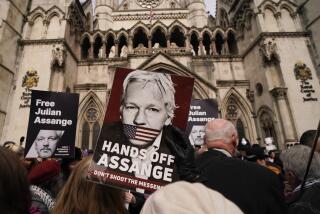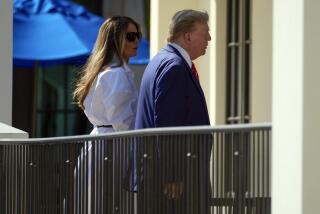Court urged to reject appeal of rendition case
The Obama administration urged a federal appeals court Monday to toss out a lawsuit about CIA clandestine operations in the alleged kidnapping and torture of terrorism suspects.
At the same time, Justice Department officials in Washington pledged to review all cases in which the Bush administration invoked the right to protect state secrets and pledged to ask for secrecy “only in legally appropriate situations.”
The Obama administration’s assertion of the so-called state secrets privilege in a San Francisco courtroom -- the first instance since President Obama took office -- reflected the continuing debate among national security and Justice officials about what clandestine operations should be shielded from public scrutiny.
A Justice Department attorney, Douglas Letter, told the U.S. 9th Circuit Court of Appeals that the Obama administration was taking “exactly” the same position as the previous White House in calling for dismissal of a lawsuit by five terrorism suspects snatched by U.S. agents in foreign countries and delivered to secret detention sites in other countries.
The suit, Mohamed et al vs. Jeppesen DataPlan Inc. of San Jose, accused the flight services company of knowingly “participating in the CIA’s extraordinary rendition program” and delivering dozens of men to foreign venues where they were subjected to torture and other treatment impermissible under U.S. law.
The case was “thoroughly vetted with the appropriate officials of the new administration,” said Letter, who represented the Bush administration’s opposition to the lawsuit as well. Letter said the judges would understand the government’s stance once they read a classified affidavit explaining its claim of state secrets privilege.
In Washington, meanwhile, Atty. Gen. Eric H. Holder Jr. ordered a review of all cases in which the former administration claimed state secrets were at stake.
“The attorney general has directed that senior Justice Department officials review all assertions of the state secrets privilege to ensure that it is being invoked only in legally appropriate situations,” Justice Department spokesman Matt Miller said.
The randomly drawn appeals court panel, consisting of three Democratic appointees, appeared skeptical of the government’s claims.
“I can understand the government saying we have secrets and you the court can’t pry them open,” said Judge William C. Canby Jr., a Carter appointee. But noting that disclosure of rendition details has been made in other litigation, Canby said of the Jeppesen case, “So what?”
That assertion of secrecy to protect national security was also invoked by the Bush administration to blunt lawsuits challenging the government’s warrantless wiretapping practices.
The American Civil Liberties Union, which brought the suit on behalf of the five terrorism suspects, told the 9th Circuit panel that there was no basis for branding the entire case secret and urged the judges to allow trial.
ACLU lawyer Ben Wizner said foreign governments have been “very open” about their roles in the covert operations. By permitting a trial, “the court is not exposing the government to any harm,” he told the judges.
“The notion that you must close your eyes and ears to what the whole world knows is absurd,” Wizner said.
A federal trial judge ruled in favor of the Bush administration last year and dismissed the suit. The ACLU appealed to the 9th Circuit, arguing that the men should be given the opportunity to prove their case without classified material.
At one point during the hearing, Judge Michael Daly Hawkins, a Clinton appointee, told the government’s lawyer that he was not convincing.
“So any time the executive branch of the government says the fact is classified, it means it cannot be examined?” Hawkins asked Letter.
Letter, noting that national security was at stake, told the court it should “not play with fire” by permitting the suit to go forward.
“Nor should the government in asserting [secrecy] privilege,” Hawkins shot back.
Judge Mary M. Schroeder, a Carter appointee, said the court had not yet read the classified information about the government’s case and noted that the law “may really preclude” the court from permitting the case to go to trial.
A ruling is not expected for several weeks.
Lawsuits brought against the CIA and other agencies for alleged illegal conduct in the Bush administration’s rendition program have been summarily dismissed by federal judges bowing to assertions of the state secrets privilege.
So-called extraordinary rendition involves the clandestine capture and transport of suspected terrorists to secret detention and interrogation facilities outside the United States, where human rights activists allege that prisoners were subjected to torture and other treatment impermissible under U.S. law.
The five men who brought the suit against Jeppesen are: Ethiopian-born Binyam Mohamed, a longtime British resident accused by U.S. agents of plotting to bomb U.S. cities; Ahmed Agiza, an Egyptian father of five seized from his place of asylum in Sweden; Abou Elkassim Britel, an Italian citizen of Moroccan origin arrested in Pakistan on immigration charges; Mohamed Farag Ahmad Bashmilah, a Yemeni apprehended in Jordan while on a family visit in 2003; and Bisher Rawi, an Iraqi and legal British resident seized by U.S. agents during a business trip in Gambia in late 2002. Rawi and Bashmilah have been released without charges to Britain and Yemen, respectively, and Mohamed remains imprisoned at Guantanamo Bay, Cuba; Agiza is in Egypt, and Britel is in Morocco.
--
carol.williams@latimes.com
More to Read
Start your day right
Sign up for Essential California for news, features and recommendations from the L.A. Times and beyond in your inbox six days a week.
You may occasionally receive promotional content from the Los Angeles Times.








